Key takeaways:
- Code reviews enhance code quality and foster a culture of learning within development teams through knowledge sharing and collaboration.
- Common challenges in code reviews include communication gaps, subjectivity in coding styles, and emotional responses to feedback.
- Best practices for effective reviews involve establishing clear guidelines, providing actionable feedback, and scheduling dedicated time for reviews.
- Constructive feedback should focus on clarity, balance positive remarks with critiques, and encourage open dialogue to enhance understanding.
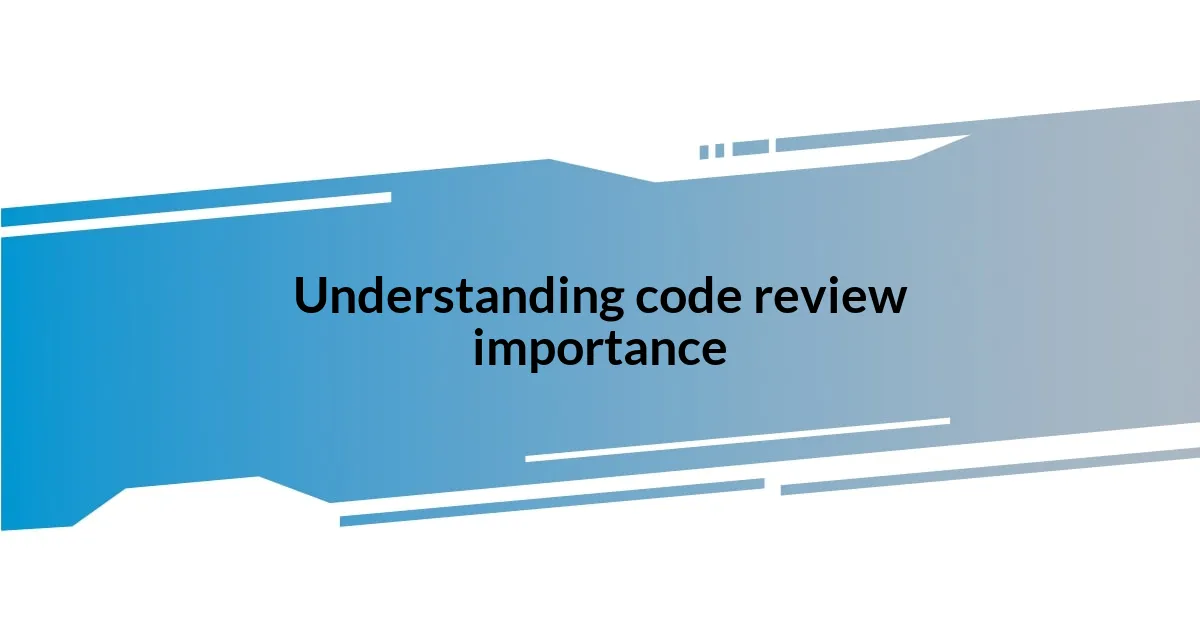
Understanding code review importance
Code reviews are essential not just for improving code quality but for fostering a culture of learning in a development team. I remember a time when a colleague caught a critical bug in my code during a review; it wasn’t just a relief but a moment of camaraderie that made me appreciate the collaborative spirit of our work. Isn’t it incredible how sharing knowledge can elevate the entire team?
From my experience, participating in code reviews can feel like a rite of passage for developers. It’s often nerve-wracking to expose your work to critical eyes, but this vulnerability can spark invaluable discussions that deepen understanding. How often have you found yourself learning something new just from the feedback of a peer? Such exchanges create a rich environment for growth.
Moreover, code reviews can serve as a safety net, catching potential issues before they escalate into larger problems. I vividly recall instances where a careful review not only identified a flaw but also led to innovative solutions that I had never considered. Isn’t it fascinating how a simple dialogue can lead to breakthroughs that benefit the whole project?
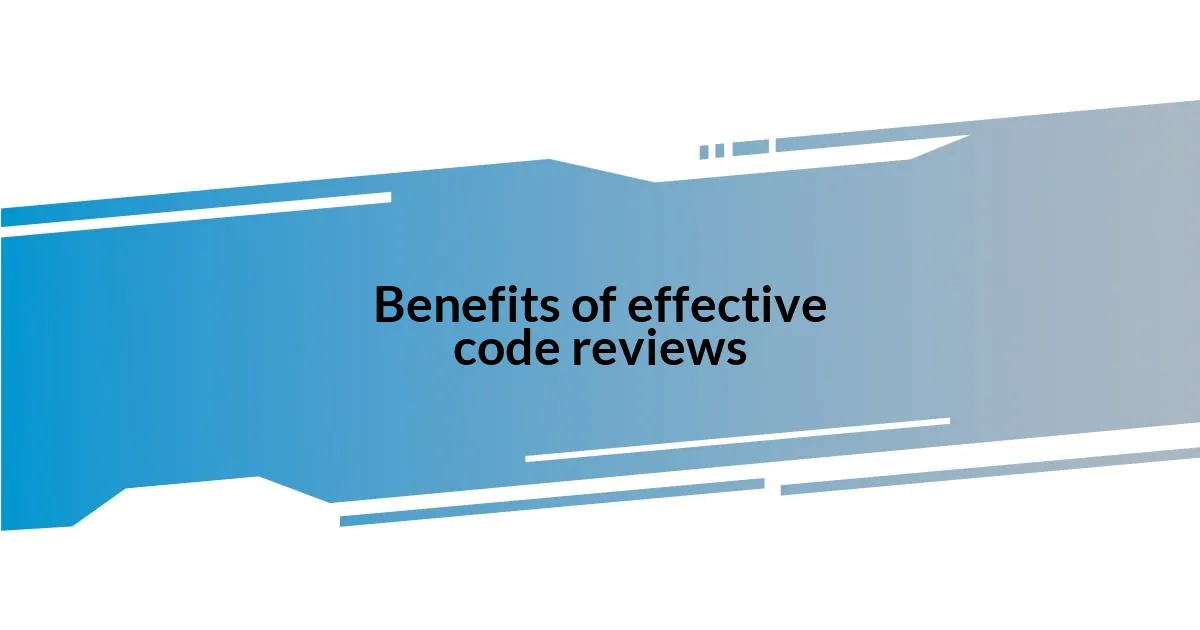
Benefits of effective code reviews
Effective code reviews offer a platform for knowledge sharing, allowing team members to learn from each other’s experiences. I’ve been in situations where a peer highlighted a more efficient approach to a common problem, and I was genuinely grateful for that insight. This not only enhanced my skills but also reinforced the collaborative nature of our team dynamics of continuous learning. Without that perspective, I might have stuck to less efficient methods.
Additionally, one of the most significant benefits of code reviews is the enhancement of code quality. When I look back at my early days of coding, I remember the relief and pride I felt when a reviewer pointed out simple yet critical aspects I overlooked. These moments help ensure that we maintain high standards, resulting in cleaner, more maintainable code. Who doesn’t want to take pride in their work and deliver something that truly reflects their best effort?
Finally, regular code reviews contribute to improved team cohesion. I recall a coding session where we faced a particularly sticky problem, but discussing it during a review turned into a mini brainstorming session. It was then that I realized that our code review process not only improved our project but also strengthened our relationships. The social aspect cannot be underestimated—it encourages open communication and fosters trust among team members.
| Benefit | Description |
|---|---|
| Knowledge Sharing | Enhances learning through peer feedback. |
| Code Quality | Catches bugs and improves maintainability. |
| Team Cohesion | Strengthens relationships through collaboration. |
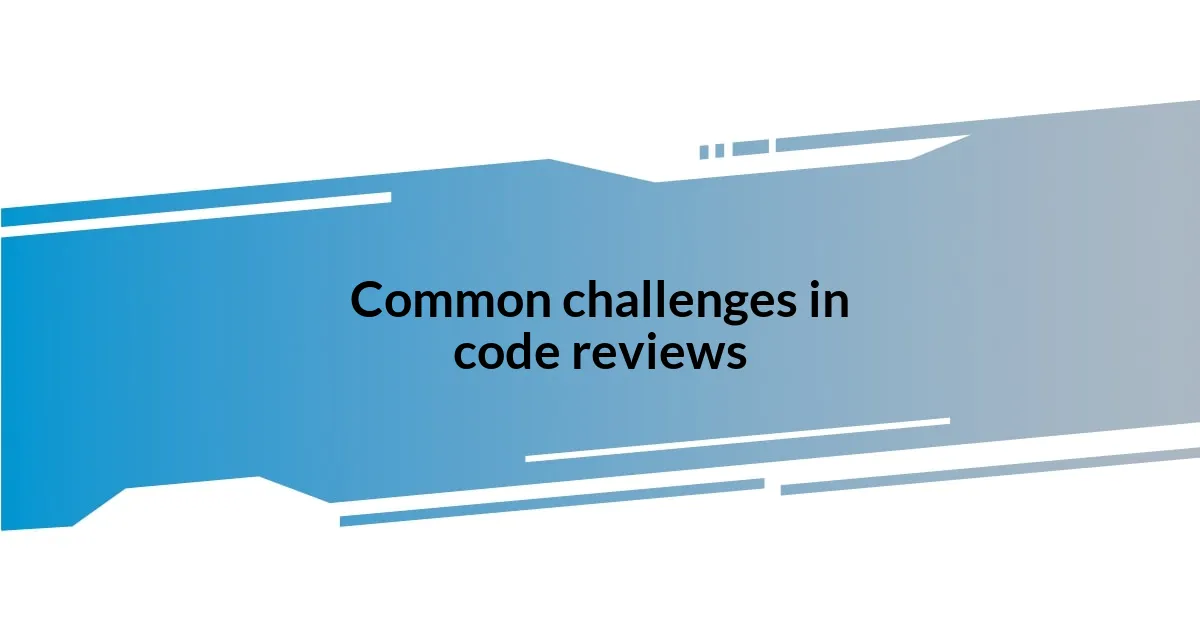
Common challenges in code reviews
Code reviews can sometimes become a battleground of differing opinions. I’ve seen discussions escalate into debates, where team members are passionate about their perspectives. It can be tough walking the line between constructive criticism and defensive reactions. I’ve been that developer on the receiving end of feedback, feeling slightly wounded, yet I realized later how important it was to keep an open mind.
Here are some common challenges I’ve encountered during code reviews:
- Communication Gaps: Misunderstandings can arise if the reviewer and author aren’t aligned on project goals.
- Subjectivity: Different coding styles and preferences can make it hard to reach consensus on what “good code” looks like.
- Time Constraints: Tight deadlines can pressure reviewers, leading to hasty reviews that overlook critical issues.
- Emotional Responses: Feedback can feel personal, making it crucial to maintain a constructive environment.
- Varying Experience Levels: Disparities in knowledge can result in some suggestions feeling irrelevant or unhelpful.
Navigating the intricacies of code reviews isn’t always straightforward. I remember a time when a colleague and I had opposing views on a specific coding pattern. It took a bit of back-and-forth, but we finally arrived at a middle ground that incorporated both our ideas. Those moments may be frustrating, but they also remind me that good discussions can lead to better solutions.
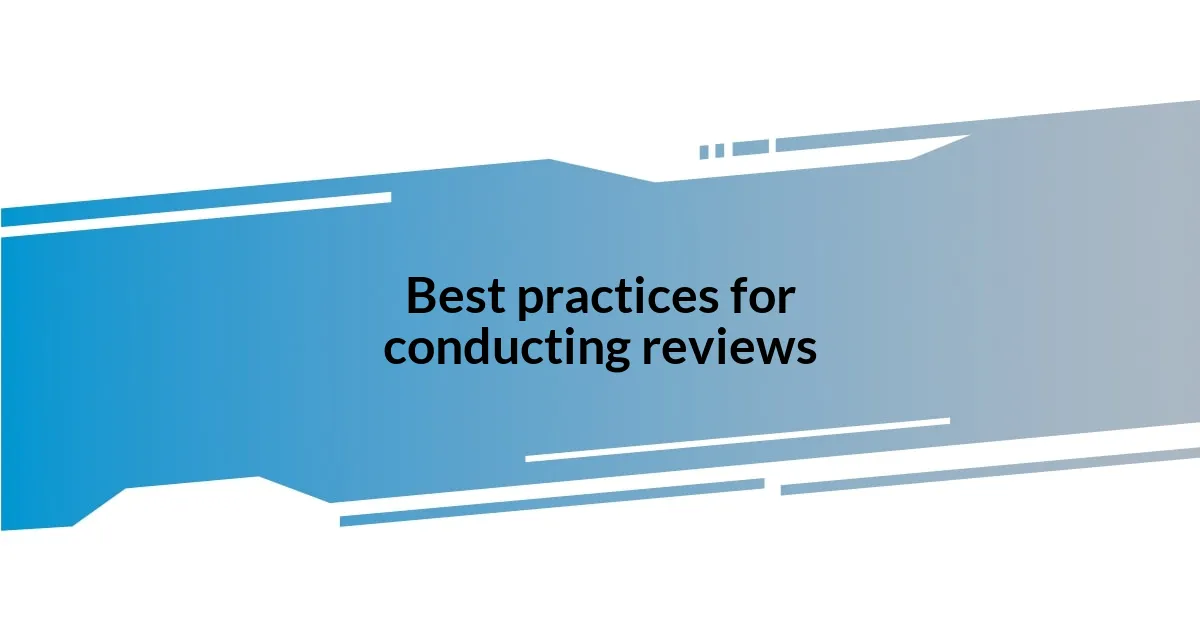
Best practices for conducting reviews
One of the best practices I’ve learned for conducting effective code reviews is to establish clear guidelines upfront. When I first began participating in reviews, I noticed that having a structured approach made a significant difference. By agreeing on specific criteria—like code readability and adherence to style conventions—everyone was on the same page. This clarity not only smoothed the review process but also fostered mutual understanding among team members.
Another aspect I focus on is providing actionable feedback. I remember a time when I received vague comments like “this doesn’t look right.” That didn’t help me improve at all! Instead, I aim to offer specific examples of what could be enhanced, along with suggestions for improvement. It’s amazing how much more productive discussions become when reviewers take the time to explain their reasoning. It’s almost as if you’re crafting a roadmap together rather than simply marking off mistakes.
Finally, timing plays a crucial role in making code reviews effective. I’ve found that setting aside dedicated time slots for reviews, rather than cramming them in during breaks or when deadlines loom, results in much more thoughtful feedback. When I respect this boundary, I notice that both I and my peers are more engaged in the process. After all, who wants to feel rushed when they’re putting their best work forward? A little time can transform a routine review into a collaborative learning experience.
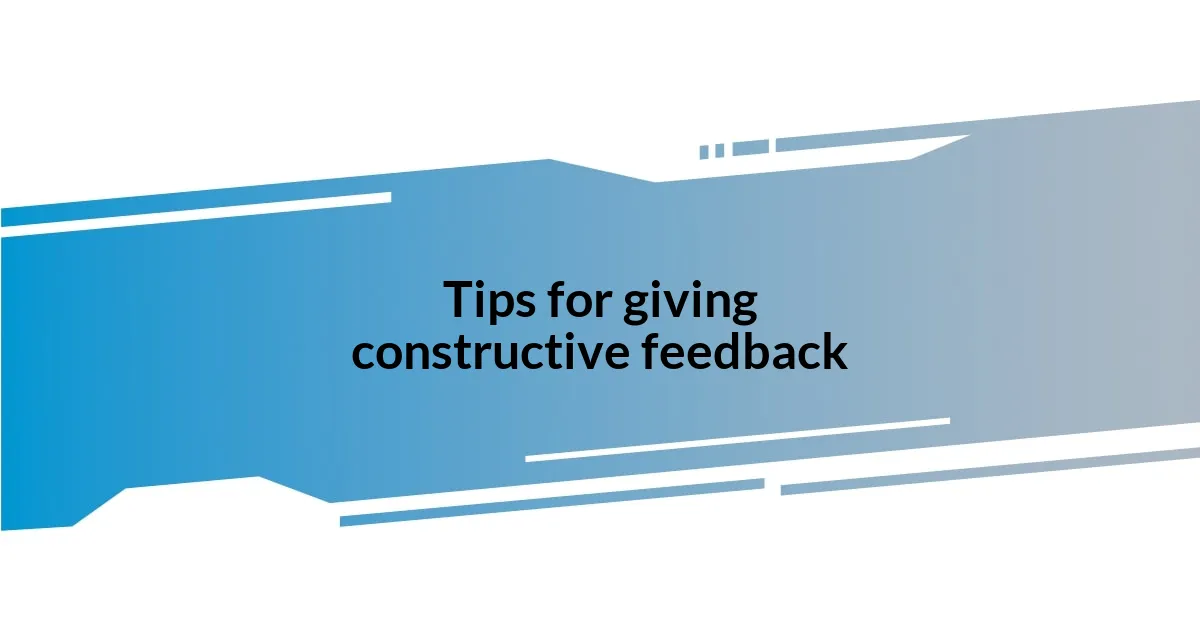
Tips for giving constructive feedback
When giving constructive feedback, aiming for clarity is essential. I once reviewed a colleague’s code and made the mistake of saying, “This part could use improvement.” In hindsight, I realized how unhelpful that vague statement was. I now strive to be specific, suggesting concrete alternatives or even pointing out the exact lines that could be revised. Have you ever received feedback that left you scratching your head? I know that perplexity can stall progress, and addressing it head-on can foster engagement.
Another crucial tip is to acknowledge the positives alongside the critiques. In one of my early experiences, I faced feedback that left me feeling deflated, as no acknowledgment was given to what I had done well. I learned that balancing remarks with praise not only boosts morale but also creates an atmosphere where the give-and-take of ideas feels more collaborative. When I highlight what I appreciate in someone’s work, it often opens the door to a more productive conversation. Doesn’t it feel better when someone recognizes your efforts, even if they bring up areas for growth?
Lastly, I believe it’s vital to encourage a dialogue rather than a one-way street. I once led a review where I posed open-ended questions, inviting the author to share their thought process. The discussion blossomed from there, and we uncovered insights we hadn’t considered yet. This shift from simply pointing out flaws to engaging in a conversation enhances understanding on both sides. If I’m going to offer feedback, I want it to contribute to a richer, more nuanced understanding of the code—and I think you’d feel the same!